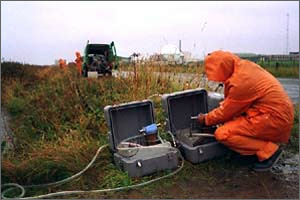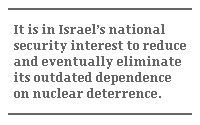Rogue Nuclear Programs Require Creative Approach
Rogue Nuclear Programs Require Creative Approach

VIENNA: President Bush calls them the "axis of evil," an awkward phrase, given their apparent lack of coordination in confronting the forces of good in the world. But Iraq, Iran, and North Korea do form a trio of the worst proliferators in the history of the Non-Proliferation Treaty (NPT). No other countries have signed the NPT and so blatantly violated its solemn undertakings. Yet to fully address the challenge they pose one has to look beyond the immediate task of restarting or improving inspections to a broader regional approach.
So how to dissuade the three recalcitrant NPT parties? These countries' past practices are such that none of the inspection regimes currently under contemplation is likely to provide the required confidence that they have foresworn nuclear weapons. That confidence will arise only over time, when evidence of a substantial change in national policy combines with technical judgments made by the International Atomic Energy Agency (IAEA) that nuclear weapons are not being pursued. What is needed in each case is a much more intrusive inspection regime than traditional safeguards and the IAEA's Additional Protocol alone would provide, coupled with security assurances and regional political initiatives. (The Additional Protocol provides for the use of environmental sampling and short-notice inspections, among other measures, in order to strengthen the traditional IAEA safeguards system.)

For Iraq, the legal basis for verification already exists in the variety of U.N. Security Council resolutions meted out over the past decade, to continue monitoring its imports and exports and allow nuclear activities only in areas such as medicine, agriculture, hydrology, and the like. These measures should be continued for the foreseeable future. Because the Iraqis live in a bad neighborhood, there is much to be gained by following through with the long-term monitoring and verification regime that was decided by the Security Council after the first Gulf War.
Some would argue the jury is still out on Iran, that its violations of its NPT commitments are not as clear as those of Iraq and North Korea. As a matter of law, these observations may be correct; from the perspective of its neighbors and the rest of the world, these legal niceties aren't worth very much. Iran has been carefully pursuing the nuclear option for well over a decade, for reasons that are understandable, even if we may not agree with the policies the ruling clerics have apparently chosen. But Iran is in a period of transition, which should prompt the international community both to impose greater restrictions on its nuclear program and to provide incentives for good behavior. It is not, as the Iranians argue, a question of trading their accession to the Additional Protocol for greater access to sensitive nuclear technology. Their behavior in concealing major nuclear research programs should foreclose any rewards in this regard. Iran should immediately sign the Additional Protocol, allow its full and unimpeded application, and make transparent its nuclear program in order to assure its neighbors and the international community that it will stick by its NPT commitments. In addition, Iran should not for the foreseeable future complete its uranium enrichment and heavy water production facilities, but should rather be guaranteed a supply of low-enriched fuel coupled with the guaranteed return of spent fuel the Russians have required.

Iran should be provided incentives for agreeing to this course of action. The removal of Saddam's regime next door has eliminated the most significant threat to Iran's security, so the environment has already markedly changed. A major incentive, but not a quid pro quo, for Iran would depend on Israel, which should adopt a "no-first-use" nuclear policy and agree to scrap its nuclear weapons entirely if and when peace behind stable boundaries can be achieved. (Israel has stated only that it will not be the first to "introduce" nuclear weapons into the Middle East. Moshe Dayan reportedly said it wouldn't be the second, either.) No one can doubt the United States' willingness to spill its own blood in defense of Israel, and it is in Israel's national security interest to reflect that reality by reducing and eventually eliminating its outdated dependence on nuclear deterrence.

The United States and the other weapons states similarly should pledge not to be the first to use nuclear weapons in the Middle East. Without this minimal commitment, it is unreasonable, given regional politics and psychology, to expect any nation to completely foreswear the nuclear option. For the American devotees of a muscular nuclear posture, the loss of some operational flexibility of questionable value surely is a small price to pay for the prospect of a nuclear-free Middle East.
Within the context of the road map, other initiatives could be envisioned, such as non-aggression treaties bolstered by external commitments of the major powers, international recognition of current borders, and guarantees of their integrity, and other complementary measures.

A similar set of intrusive inspections and security guarantees should be employed in North Korea, in this case coupled with substantial amounts of food and financial assistance and inter-Korean confidence-building measures. Japan's clear reaffirmation of its non-nuclear policies will be a necessary element. Any satisfactory result of the ongoing discussions about North Korea's nuclear future will depend largely on agreements reached primarily by the countries in the region, plus the United States. But perhaps other parties, like the European Union and the United Nations, could play appropriate roles. As in the Middle East, only a creative combination of regional undertakings and external security assurances, combined in this case with assistance to the cash-strapped nation, is likely to defuse the North Korean crisis.
These proposals do not contend, as some have, that the IAEA inspection regime cannot adequately verify nonproliferation commitments; rather, they recognize the fact that the inspections regime, including the necessary Additional Protocol, will succeed only when wedded to considerable complementary political commitments. A framework of security assurances and other creative diplomatic initiatives is thus the necessary prerequisite to ensure greater confidence in the technical determinations made by the IAEA's inspectorate.
Arch W. Roberts, Jr. was a senior staff member of the Committee on Foreign Affairs in the U.S. House of Representatives. He currently works at the International Atomic Energy Agency. However, the views expressed here are his own and do not in any way represent the policy of the Agency.